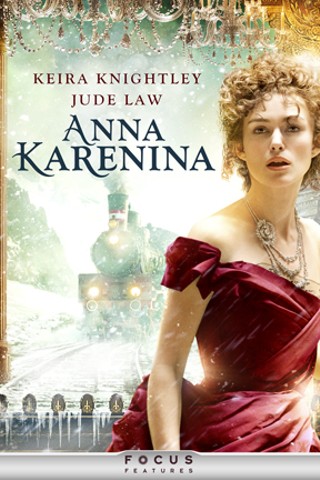As a director, Joe Wright largely thinks in terms of sweeping romances.
His Pride and Prejudice played it close to the vest, while Atonement swung the pendulum entirely in the other direction, focusing more on his own craftsmanship and big thinking as a filmmaker. Anna Karenina is more like Atonement, although with such a beloved novel as its launching pad, perhaps Wright should have kept his hands in his pockets a bit more: His style dwarfs the substance.
Presented at times as a play—with scenes occurring in the fly gallery above the stage or with a crew moving sets on and off camera—Anna Karenina really isn't about the story at all. It's about seeing what tricks and gimmicks Joe Wright can bring to the story. The actors are effectively the background, and the mechanics of the filmmaking are what stars. It's an incredibly selfish way to make a movie.
On the other hand, it could also be an exhilarating way to make this movie. Wright frees himself from the traditional trappings of epic, doomed love stories and tragic heroines by giving us, for lack of a better comparison, Moulin Rouge! without the songs. It is arch, outwardly artistic, shamelessly broad, annoyingly colorful and more than a little brash—but that has more significant disadvantages than advantages.
There are other considerations beyond the director's vision, however, principally concerning the performances. Despite being married, Anna (Keira Knightley) has taken a lover, the dashing Count Vronsky (Aaron Taylor-Johnson). This was no small thing in aristocratic 19th-century Russian society. Because Wright's tinkering cuts to the chase of every conversation, there is no emotional buildup in any scene; each confrontation or confession of love is full-throated from beginning to end. The effect is that each scene feels cut together like a movie trailer, where you're only supposed to get the main points. Wright's directing was likely brutal on the actors, particularly Knightley and Taylor-Johnson, whose characters actually do have a wide range of emotions to convey, but are forced by design to treat each one like a paint swatch, merely and quickly representing something more real. Knightley, who has chosen not to handle Anna with kid gloves and displays some genuine ugliness, has to bounce from romance-literature icon to Cruella de Vil. It's just not convincing.
As her old-news husband, Jude Law is more measured. As her philandering, high-living brother, Matthew Macfadyen makes quite an impression, thanks to fewer scenes and a devil-may-care approach. But this all underscores the point: Because Law is supposed to be cloaked in melancholy most of the time, that emotion is conveyed more easily. And because Macfadyen is supposed to make us laugh, it's an easier target to hit.
They're outlying characters, and our connection to Anna Karenina doesn't flow from them. We just can't bounce in as many directions as Anna does, as quickly as she does, because of the way this film is woven together. It's troubling to see a potentially great performance by Knightley undercut like this. To be sure, she is not at the top of her game, but how could she be when her character is merely set dressing for the machinations of the director that he so desperately wants you to see instead?
On a positive note, let it not be said that this is anything but a gorgeous-looking film. The production design is immaculate and daring, and the costumes would make peacocks blush. It is beautiful down to its last stitch. But, of course, if you were showing off as much as Joe Wright, why would you spare any expense on the baubles?











